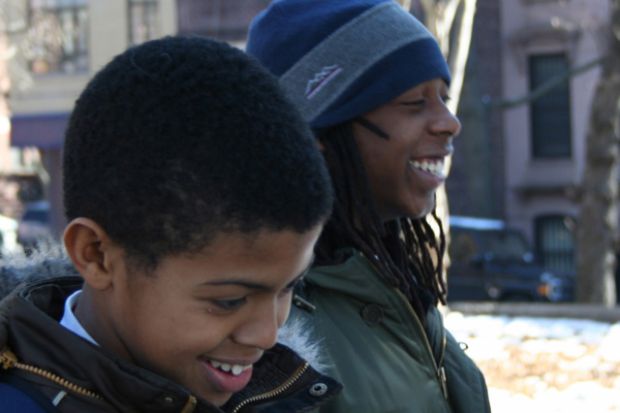 Twelve years of shooting, more than 13 years in the making, and a full year after they came to the TV Critics Association winter press tour to promote it, the documentary “American Promise” makes its debut on the season finale of “POV” (PBS, 10 p.m., check local listing).
Twelve years of shooting, more than 13 years in the making, and a full year after they came to the TV Critics Association winter press tour to promote it, the documentary “American Promise” makes its debut on the season finale of “POV” (PBS, 10 p.m., check local listing).
It’s an engrossing look at two African American boys whose families enroll them into the high-priced and formerly all-white private Dalton School after the institution decides to try to diversify. The value in the work is getting to know them as they grow through the school, from when they are scampering first graders, up to middle school, and then through high school where the pressures just get tougher and tougher.
Part of the pressure is societal of course. Can the bright young men make it in a school tailored for generations for the white upper class? But the rest of the pressure is from the families. For poor Idris Brewster, his parents seem to follow his every move in school, every test, every paper, dogging him on every task even as they expect big things on the basketball court from an admittedly small point guard. And they’re the ones who are the filmmakers here as well.
The other student, the more laid back Seun Summers, has his own problems, chiefly in the form of family tragedies he has to face which are not all that unusual. His decision not to stay in Dalton for high school is crucial to his own success, and yet the former pals quite naturally have divergent paths.
Idris dad is a little disappointed his son doesn’t see the importance of Barack Obama’s election as president, and yet one can’t help think of a young Obama when we see the determined basketball player and clever, ambitious student.
Few films allow this kind of overview — the exception is Michael Apted’s “7 Up” series. Following the youngsters as they grow is at once fascinating, heartening and heartbreaking. And as educators stuggle with what becomes the stated purpose of the film is — to illustrate the crisis among African-American boys in school — there is no conclusion. The solutions of “American Promise” are left to us.
A year ago at press tour, filmmaker and father Joe Brewster said the original direction of the film was different: a wider look at diversity.
“Dalton at that time had decided it would make its school look like the city of New York and we were one ofthe first wave of parents that were asked to participate in that,” he siad. “In fact, the film was called at that time ‘The Dalton Experiment,’ and I think from that initial inquiry we had five parents whoagreed to participate.”
Twelve years is a long time, said Michele Stephenson, the co-director and mother of Idirs. “By the time middle school hit, it ended up being just the two African American boys and their families left,” she said. “When we started, we didn’t really know what this journey was going to be.
“We knew we were going to document something around diversity. We were going to document the families’ experiences and the boys’ experiences, and we knew that with the fate that we had and what longitudinal studies do, and being inspired by Michael Apted and his work, we thought that we would have something by the end of this journey to the end of high school,” Stephenson said. “And the other family, they were friends before Seun and his family were actually friends before we picked up the camera, so it was a conversation among friends and a commitment to each other as friends and as families to take this journey and keep the cameras and roll with the cameras.”
For his part, Idris, now a sophomore at Occidental College in California, said he can’t quite recall his reaction when it started. “From when I can first remember, I had a camera around me,” he said, “so I don’t think I had a choice, but I’m glad I did. I’m glad I participated.”